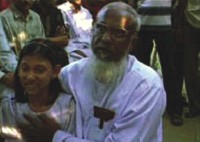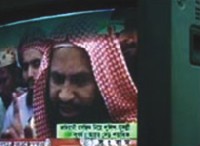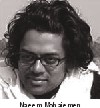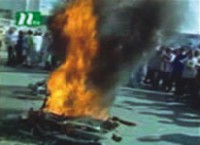'Muslims
or Heretics?'
A Film on Minority Repression
AASHA MEHREEN AMIN
 Newspaper
reports of the Ahmadiyya community being victimised by religious
extremists have managed to rankle the conscience of some people,
for a while at least, but have not gone beyond evoking the momentary
indignation that is all too soon lost among the other horrific
news of the day. Yet the enormity of the crime against a minority
cannot be lessened by the apathy of the majority. The facts
remain-- for months members of the Ahmadiyya community have
been systematically stalked, attacked brutally, intimidated,
their place of worship burnt down, their books banned and members
murdered in cold blood.
Newspaper
reports of the Ahmadiyya community being victimised by religious
extremists have managed to rankle the conscience of some people,
for a while at least, but have not gone beyond evoking the momentary
indignation that is all too soon lost among the other horrific
news of the day. Yet the enormity of the crime against a minority
cannot be lessened by the apathy of the majority. The facts
remain-- for months members of the Ahmadiyya community have
been systematically stalked, attacked brutally, intimidated,
their place of worship burnt down, their books banned and members
murdered in cold blood.
All this
happened in a country where the Constitution guarantees that
"every citizen has the right to profess, practice or propagate
any religion" (Article 41, 1a) and that "every religious
community or denomination has the right to establish, maintain
and manage its religious institutions" (Article 41, 1b).
 It
is precisely to combat collective desensitisation towards horrendous
injustices that a medium like film is so crucial. Naeem Mohaiemen,
a media activist from New York with the help of Drishtipath,
a human rights organisation based in the same city and Drik
Picture Library (Dhaka), has made a documentary 'Muslims or
Heretics?' on the anti- Ahmadiyya movement that threatens the
very basis of a democratic nation. The documentary presents
the imagery and information necessary to keep reminding us that
such crimes continue unhindered and must be protested, not by
a handful of conscious citizens but by the silent majority.
It
is precisely to combat collective desensitisation towards horrendous
injustices that a medium like film is so crucial. Naeem Mohaiemen,
a media activist from New York with the help of Drishtipath,
a human rights organisation based in the same city and Drik
Picture Library (Dhaka), has made a documentary 'Muslims or
Heretics?' on the anti- Ahmadiyya movement that threatens the
very basis of a democratic nation. The documentary presents
the imagery and information necessary to keep reminding us that
such crimes continue unhindered and must be protested, not by
a handful of conscious citizens but by the silent majority.
 Directed
by Naeem Mohaiemen, who, among other things, is editor and Associate
Editor of online news networks Shobak.org and AltMuslim.com
respectively, the film traces the anti- Ahmadiyya movement to
the late 50s. During this time the Jamaat-i-Islami (of Pakistan)
launched a campaign that continued sporadically leading up to
the banning of Ahmadiyya books in Pakistan and the state declaration
that they were non-Muslims. In 1986 the 'Blasphemy Law' was
passed which proclaimed death to any kind of blasphemy against
Islam. This obviously could stretch to include divergent views
in Islamic doctrines that did not conform to majority Muslim
thinking.
Directed
by Naeem Mohaiemen, who, among other things, is editor and Associate
Editor of online news networks Shobak.org and AltMuslim.com
respectively, the film traces the anti- Ahmadiyya movement to
the late 50s. During this time the Jamaat-i-Islami (of Pakistan)
launched a campaign that continued sporadically leading up to
the banning of Ahmadiyya books in Pakistan and the state declaration
that they were non-Muslims. In 1986 the 'Blasphemy Law' was
passed which proclaimed death to any kind of blasphemy against
Islam. This obviously could stretch to include divergent views
in Islamic doctrines that did not conform to majority Muslim
thinking.
As the documentary
projects, history is repeating itself, this time in democratic,
apparently pluralistic Bangladesh. Religious extremists have
taken the law into their own hands, that too with tacit state
acquiescence.
The images
are indeed frightening. A frenzied cleric at a congregation
in Brahminbaria, where much of the violence took place, rants
"Get ready to give blood. We must take over the Ahmadiyya
mosque". His tirade is greeted with applause. A young girl
in an interview says how a village elder prevented her and her
classmates from attending school just because they were Ahmadiyyas.
Even the teachers would not correct their copies. In another
clip the cleric threatens "We will make sure they cannot
stay, they are bastard Ahmadiyyas." Again roars of encouragement
from the crowd.
 There
are more shocking images. Severely wounded victims lying in
hospital. Stills of dead bodies. One victim describes how he
was first beaten with sticks by a group of women who stalled
him until reinforcements of male attackers came to try and finish
the job.
There
are more shocking images. Severely wounded victims lying in
hospital. Stills of dead bodies. One victim describes how he
was first beaten with sticks by a group of women who stalled
him until reinforcements of male attackers came to try and finish
the job.
But the
most heartrending story is that of a young girl being interviewed
about the antecedents of her father's murder by anti-Ahmadiyya
militants. As she starts to relate how her father was beaten
to death because he refused to bow down to their demands, she
breaks down and can barely speak. She says she knows who they
are-- they were her neighbours.
Interspersed
with the horrific accounts of the victims are interviews with
Ahmadiyyas in various professions. An Ahmadiyya missionary comments
that the kind of Taleban-styled Islam these religious zealots
are promoting, pose a threat not only to the Ahmadiyya community
but for the nation as a whole. He explains that the notion that
our prophet (PBUH) has endorsed such a militant version of Islam
is not correct. The prophet (PBUH), he says, never asked for
or pursued state power, rather it was the political circumstances
that placed state power upon him. In any case, continues the
missionary, the prophet always promoted a peaceful, tolerant
Islam.
The 40-minute
documentary was shown at the Russian Cultural Centre on May
1 and was followed by a discussion between the viewers and a
panel including Faustina Pereira, a human rights lawyer, Naeem
Mohaiemen, the film's director and Swadhin Sen, a lecturer of
Anthropology at Jahangirnagar University.
It was during
this session that a member of the audience, Kavita Chakma, of
Hill Women's' Federation, reminded everyone that similar repression
had taken place on the Jummo people of the Chittagong Hill Tracts
with little protest from the Bangali public. Even during these
incidents, the plight of the marginalised community was treated
with indifference and insensitivity.
Naeem Mohaiemen,
before the film began, in his brief address, argued that Bangladeshi
Muslims have not taken any lessons from the stark example of
oppression of Muslim minorities in the US. Instead Muslims are
committing the same crimes against minorities in Bangladesh.
The film
therefore, declares some unpleasant home truths. That in spite
of our label of democracy we are moving towards fascism and
communalism. That minorities continue to be marginalised and
oppressed with the implicit state approval. That we are becoming
more and more passive towards gross violations of human rights
happening right before our eyes. Naeem Mohaiemen, who has been
a virulent opponent of the US occupation of Iraq, has taken
a courageous step in projecting a disturbing issue few people
are comfortable about addressing.

 Newspaper
reports of the Ahmadiyya community being victimised by religious
extremists have managed to rankle the conscience of some people,
for a while at least, but have not gone beyond evoking the momentary
indignation that is all too soon lost among the other horrific
news of the day. Yet the enormity of the crime against a minority
cannot be lessened by the apathy of the majority. The facts
remain-- for months members of the Ahmadiyya community have
been systematically stalked, attacked brutally, intimidated,
their place of worship burnt down, their books banned and members
murdered in cold blood.
Newspaper
reports of the Ahmadiyya community being victimised by religious
extremists have managed to rankle the conscience of some people,
for a while at least, but have not gone beyond evoking the momentary
indignation that is all too soon lost among the other horrific
news of the day. Yet the enormity of the crime against a minority
cannot be lessened by the apathy of the majority. The facts
remain-- for months members of the Ahmadiyya community have
been systematically stalked, attacked brutally, intimidated,
their place of worship burnt down, their books banned and members
murdered in cold blood. It
is precisely to combat collective desensitisation towards horrendous
injustices that a medium like film is so crucial. Naeem Mohaiemen,
a media activist from New York with the help of Drishtipath,
a human rights organisation based in the same city and Drik
Picture Library (Dhaka), has made a documentary 'Muslims or
Heretics?' on the anti- Ahmadiyya movement that threatens the
very basis of a democratic nation. The documentary presents
the imagery and information necessary to keep reminding us that
such crimes continue unhindered and must be protested, not by
a handful of conscious citizens but by the silent majority.
It
is precisely to combat collective desensitisation towards horrendous
injustices that a medium like film is so crucial. Naeem Mohaiemen,
a media activist from New York with the help of Drishtipath,
a human rights organisation based in the same city and Drik
Picture Library (Dhaka), has made a documentary 'Muslims or
Heretics?' on the anti- Ahmadiyya movement that threatens the
very basis of a democratic nation. The documentary presents
the imagery and information necessary to keep reminding us that
such crimes continue unhindered and must be protested, not by
a handful of conscious citizens but by the silent majority. Directed
by Naeem Mohaiemen, who, among other things, is editor and Associate
Editor of online news networks Shobak.org and AltMuslim.com
respectively, the film traces the anti- Ahmadiyya movement to
the late 50s. During this time the Jamaat-i-Islami (of Pakistan)
launched a campaign that continued sporadically leading up to
the banning of Ahmadiyya books in Pakistan and the state declaration
that they were non-Muslims. In 1986 the 'Blasphemy Law' was
passed which proclaimed death to any kind of blasphemy against
Islam. This obviously could stretch to include divergent views
in Islamic doctrines that did not conform to majority Muslim
thinking.
Directed
by Naeem Mohaiemen, who, among other things, is editor and Associate
Editor of online news networks Shobak.org and AltMuslim.com
respectively, the film traces the anti- Ahmadiyya movement to
the late 50s. During this time the Jamaat-i-Islami (of Pakistan)
launched a campaign that continued sporadically leading up to
the banning of Ahmadiyya books in Pakistan and the state declaration
that they were non-Muslims. In 1986 the 'Blasphemy Law' was
passed which proclaimed death to any kind of blasphemy against
Islam. This obviously could stretch to include divergent views
in Islamic doctrines that did not conform to majority Muslim
thinking. There
are more shocking images. Severely wounded victims lying in
hospital. Stills of dead bodies. One victim describes how he
was first beaten with sticks by a group of women who stalled
him until reinforcements of male attackers came to try and finish
the job.
There
are more shocking images. Severely wounded victims lying in
hospital. Stills of dead bodies. One victim describes how he
was first beaten with sticks by a group of women who stalled
him until reinforcements of male attackers came to try and finish
the job.